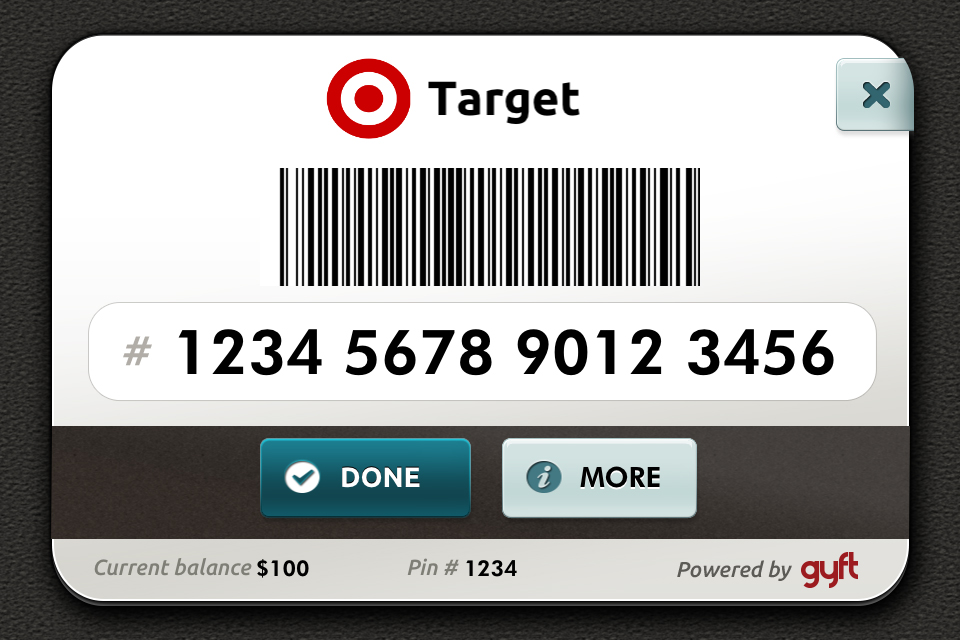Gyft, a new mobile application launching at TechCrunch Disrupt SF, allows you to buy, save and redeem gift cards using your mobile phone. Unlike the numerous mobile gifting applications currently available, Gyft isn’t attempting to carve out a spot for itself in the new “social gifting” market; it’s taking the existing $100 billion market for physical gift cards and moving it to the phone. As co-founder and CEO Vinny Lingham describes it, “we’re focusing specifically on trying to be the mobile gift card mall for consumers.”
 “When you go Walgreens or Costco and buy gift cards off the shelf, that’s the experience we’re trying to recreate on the phone,” he says. “We’ve got the widest selection of gift card retailers. And when you’ve got that big of a selection, you’re able to customize the gift card selection by [your friend’s] ‘likes’ on Facebook.” Lingham, the former co-founder and CEO of Clicks2Customers and Yola, co-founded Gyft with COO CJ MacDonald, formerly of LiveOps, and Luminate. He says he was originally interested in doing something in the mobile payments space, but after meeting with MacDonald through a mutual friend, they began discussing building a digital gift card platform on mobile. (MacDonald was particularly interested, having just gotten married and winding up with a surplus of gift cards.)
“When you go Walgreens or Costco and buy gift cards off the shelf, that’s the experience we’re trying to recreate on the phone,” he says. “We’ve got the widest selection of gift card retailers. And when you’ve got that big of a selection, you’re able to customize the gift card selection by [your friend’s] ‘likes’ on Facebook.” Lingham, the former co-founder and CEO of Clicks2Customers and Yola, co-founded Gyft with COO CJ MacDonald, formerly of LiveOps, and Luminate. He says he was originally interested in doing something in the mobile payments space, but after meeting with MacDonald through a mutual friend, they began discussing building a digital gift card platform on mobile. (MacDonald was particularly interested, having just gotten married and winding up with a surplus of gift cards.)
The company seemingly has a lot of competition, including recent Facebook acquisition Karma, as well as startups like Giftly, Wrapp, and others. But where these social gifting applications are focused on creating new ideas around gifting (Wrapp gives out free cards, for example, and Giftly works around merchants by crediting the recipient’s credit card after checkout), Gyft is about mobilizing the existing industry of plastic cards.
The problem with plastic gift cards is that they’re often forgotten, whether left at home or just not remembered at point-of-sale. Plus, with their current digital counterparts, like those sent via email, the cards tend to get lost in the inbox and also forgotten. And here’s an interesting factoid — retailers don’t actually like that people are buying gift cards that go unused. Maybe that was the case in the past, but MacDonald tells me that a 2010 law made it so that the retailers can’t actually book gift card sales as revenue until the cards are redeemed. So by keeping the cards managed in the Gyft app, which provides a visual interface for managing your collection of cards, retailers will have a new channel to remind gift card holders to use them. These reminders could come by push notifications, geo-fenced alerts, or even incentives like “get 10% off your purchase when you use your card this week.”
The app itself is attractive, well-designed and seems simple enough to use, based on the demo. You key in the numbers for the plastic cards in your wallet to add them to Gyft, or you can use the app to send virtual cards to friends. Like the plastic cards hanging on the rack at Walgreens, Gyft is working with real inventory from its retailer partners. It has also partnered with processors like Stored Value Solutions, Giftango and CashStar, which combined account for about 80% of today’s gift card programs. Gyft also has to get each retailer’s approval in order to sell their cards, upload them, check balances, and interoperate with the retailers’ backend systems.
There are several nice touches in the app, like the way it can sort your Facebook friends list by birthday or name, and the (patent-pending) way you “scratch” off the strip on the back of a virtual gift card to reveal the number. To kick off its launch at Disrupt, Gyft is offering more than $250,000 in free gift cards from retailers, including Sephora, Amazon, Lowe’s, Brookstone, Toys “R” Us, and more, which will be given out to users just for downloading the app, as well as from retailers who want you to promote them on social networks (e.g. a Facebook “like”) in exchange for a card.
The company is also announcing it has closed a “healthy” but undisclosed $1.25 million round of funding (update: the founders previously told me the amount off the record, but later this afternoon said it could be public) from Google Ventures, Founder Collective, 500 Startups, Romulus Capital and other angels. You can download Gyft on iTunes here.
Judges: Adam D’Angelo (Quora), Aileen Lee (Cowboy Ventures), David Prager (Revision3), George Zachary (Charles River Ventures).
DP: (Not a question) It’s a good idea.
GZ: What about Passport integration in iOS?
A: Apple is not actually selling gift cards right now, but our API could support that.
AL: A few companies have gone after gift cards; how are you different?
A: Those are social gifting companies. We’re going after the $100 billion plastic gift card market.
AD: Distribution plans?
A: Working with retailer partners – they want to drive customer acquisition. They’re posting on their Facebook walls and sending out emails.
DP: Do gift cards expire?
A: Merchants don’t actually like breakage. Typically, expiration is around five years, new law means money goes to state.
DP: Plans to include other vouchers (daily deals)?
A: That’s looking forward to where we are. We want store retailers to push store cards back to your gift wallet. We want to work with stored value cards.
JK: Is there a way to sell a gift card?
A: We don’t get involved with that – too many risks.
UPDATE 9-12-12, 5:30 PT: While presenting to the judges this afternoon during the Battlefield finals, Gyft announced that it will be integrated with Apple’s Passbook app in iOS 6. This means that users will be able to push cards from its app directly to recipients’ Passbook on their iPhone (as opposed to SMS or email). An update to Gyft will be pushed out to Apple in a few days’ time, the company told us via email. According to Lingham, Gyft was not 100% sure how the Passbook integration would work until today (when iOS 6 was officially announced).

